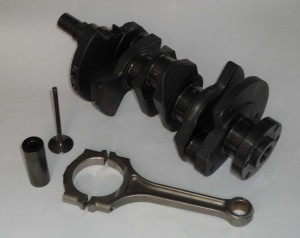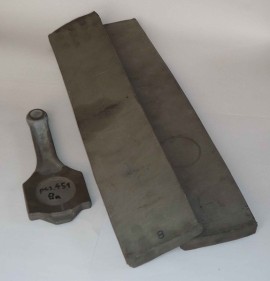
Titanium Composites
Properties like high stiffness, strength and wear resistance makes Titanium-Composites of interest for technical application. There are several existing types of Titanium-Composites like particulate or continuous fiber reinforced types. The subsequent Titanium alloys are In-Situ or particulate reinforced Titanium alloys.
Two processing routes are in use:
a. Wrought Metallurgy
The reinforcement phase, mostly TiC or TiB, is formed In-Situ during processing. This process show a very homogenous distribution of the reinforcement phase. These In-Situ reinforced alloys show excellent properties. Production cost is comparable with that of conventional titanium alloys and are significantly lower than that of powder based Titanium-Composites.
b. Powder based
Powder based Titanium-Composites are made via mixing of pre-Alloyed or elemental powders. The gas atomization of Ingots is also in use. The resulting powder is subsequently cold isostatic (CIP’ed) and hot isostatic (HIP’ed) pressed followed by forging or pressing. Advantageous of the powder process is that the content of the reinforcement could be varied over a wide range.
Properties of Titanium-Composites
Titanium-Composites extends the range of application compared to conventional Titanium alloys because of their higher stiffness and strength. Especially the low elastic modulus compared to the strength results in extra weight for many Titanium components. Another feature is the high wear resistance of Titanium-Composites. Unlike other Metal-Matrix-Composites, Titanium-Composites show a much lower wear of the counterpart because the particles like TiC or TiB show some self lubricating behavior. The ductility is lower than for conventional Titanium alloys however recently developed Titanium-Composites show good ductility values. Titanium-Composites could be used for most of the applications currently made of the traditional Titanium alloys Ti-6A-4V.
Some Titanium-Composites especially the ones with TiB phase show excellent high temperature behaviour. Compared to conventional Titanium alloys the elastic modulus drops down very slowly if temperature rises. So at high temperatures the difference between the stiffness of Ti/TiB alloys and Ti-6Al-4V could be easily more than 40%.
These exceptional properties makes Titanium-Composites very attractive for a broad range of Automotive and Aerospace application. Components that could not be made out of Titanium alloys are now feasible.
AMT can supply several different types of Titanium-Composites. We have a long term know-how in handling, designing and machining of Titanium-Composite components.
Ti-SB62
Titanium Ti-SB62 is a Titanium alloy made via wrought metallurgy. The TiB phase is formed In-Situ during processing. The TiB phase is uniformly distributed. For this class of Titanium alloys, Ti-SB62 shows exceptional high ductility. High creep resistance and high temperature strength are other features of Ti-SB62. Compared to other Titanium alloys of this material class, Ti-SB62 shows good machining behavior.
Ti-SB62 is suitable for many Automotive and Aerospace parts requiring high strength and stiffness. For some Automotive application the wear resistance is an additional advantage.


